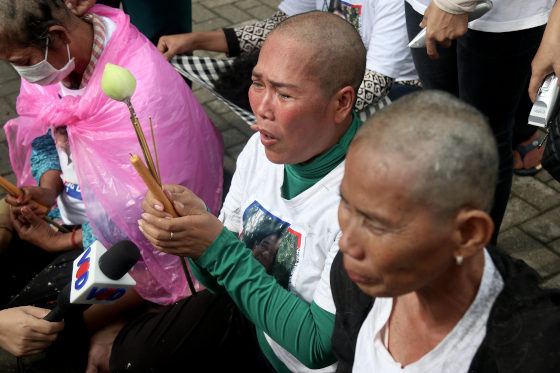
Chantha and other Friday Women shave their heads outside the U.S. Embassy in Phnom Penh to call for the release of their husbands.

Political rights activist (Friday Women), Phnom Penh
As the July 2023 National Election approaches, intimidation and scare tactics continue to be used to subdue the remaining advocates for a free and democratic Cambodia. Sexual harassment and physical violence are rampant tools in this suppression. Activists’ families suffer targeted attacks, and people retract support for them due to fear of backlash from authorities.
Prum Chantha and her family are among the many activists campaigning for political justice in Cambodia. Chantha is a prominent member of “Friday Women” – a group of women activists well-known for protesting to demand the release of their husbands who have been unjustly imprisoned for their political activity. Ahead of the upcoming National Election this July, their work is more vital than ever in helping hold accountable those who abuse their positions of power.
A political opposition needs to exist to provide constructive criticism to the ruling government, and better serve the people.
Chantha has suffered physical abuse because of her peaceful activism with Friday Women. “I have faced countless forms of harassment. [During one court protest], authorities dragged me from the road onto cement, like I was a pig. I needed a medical brace for my back for a month.” Another time, she was dragged across the street until her knees started to bleed.
Like so many other women at the forefront of human rights activism in Cambodia, Chantha has also suffered sexual harassment at the hands of authorities. “They pinched me, groped me, and scratched me,” she states, building upon the list of challenges faced as an outspoken activist. Entrenched expectations around the role of women in Cambodian society continue to hinder the work of women activists like Chantha, impacting both their confidence and their ability to fight for political justice. “I realise I’m a weak housewife, and that I should be doing chores,” she says. “But I need to be a stronger woman.”
The difficulties Chantha faces for speaking out also come from local communities. For instance, she worries about finding accommodation for a pilgrimage to Siem Reap with other Friday Women, as proprietors fear being associated with them: “Not even pagodas will accept us,” she says. Members of Chantha’s family are also activists, and her neighbours fear repercussions from being associated with Chantha and her family due to their activism.
Chantha speaks at her home in Phnom Penh.
Chantha presents a photograph of her husband Kak Komphear as she speaks. Komphear is a former senior member of the Cambodia National Rescue Party (CNRP), the opposition party that was forcibly dissolved by the Supreme Court in 2017. He was arrested and has been in jail since May 2020 after being accused of “revolutionary behaviour” for merely sharing a solidarity meal with CNRP supporters. “It was a politically motivated arrest,” says Chantha, who points out how her husband’s political activity was linked to exiled CNRP leader Sam Rainsy, during a time of heightened political tension following the 2018 National Election. Support for the opposition had reached unprecedented heights, and Chantha believes that the government was paranoid as a result.
“People from other countries can speak out,” says Chantha. “A political opposition needs to exist to provide constructive criticism to the ruling government, and better serve the people. However, when my husband spoke the truth, he was arrested.”
District and local police often visit Chantha at her home under the guise of taking care of her security. Their real aim is to extract a letter of apology from Komphear through her, implying that senior officials will consider his early release if he agrees to write one. However, both Chantha and her husband are united against the idea. Komphear has so far refused to do so, and Chantha agrees: “My response is that my husband is not wrong or guilty, so how can he apologise?”
On 24 May 2023, after this interview with Chantha was conducted, 14 former CNRP members were pardoned and released from Correctional Center 1 (CC1) prison. Twelve out of the 14 are husbands of Friday Women group members and had made public apologies to Prime Minister Hun Sen beforehand.
Chantha’s husband did not apologise. He remains in CC1 prison.
Chantha struggles with her husband’s absence, especially as she is now the sole provider. “When my husband was free, he earned money to support our family. But after he was arrested, it became very difficult. This, coupled with the arrest of my son, placed a great burden on me. I never imagined we would find ourselves in this situation.”
One of Chantha’s sons, Kak Sovannchhay, has also faced the wrath of authorities for his political associations. Chantha says this comes out of fondness for his father. She explains how Sovannchhay, then just 15 years old, visited CNRP headquarters to collect discarded flags and other materials in October 2020. “There were also other children there, collecting the same trash. They were not arrested.” says Chantha. “But my son was arrested, because authorities knew who he was.” Following his arrest, Sovannchhay was detained for three days, during which he was beaten by authorities.
Six months later in April 2021, Sovannchhay was attacked with a rock by an unidentified assailant. “Blood was gushing,” says Chantha. Three hospitals refused to treat Sovannchhay. Chantha believes that authorities must have warned them in advance, as at the fourth hospital, staff refused to admit Sovannchhay overnight once they found out who he was. His head wound was treated outdoors, and staff asked for photo evidence of their help to be deleted.
Two months later in June 2021, Sovannchhay was violently apprehended by armed police at his family home for posting comments critical of the Cambodian People’s Party in a group chat on the messaging app Telegram. He was imprisoned for three months. “There was no warrant for his arrest. No explanation,” says Chantha. “He was underage.”
In keeping with her character, Chantha went to protest the day after her son was arrested. “He did not cry. He told his lawyer to tell me to be strong and not to be afraid,” says Chantha. The severity of Sovannchhay’s treatment at the hands of authorities, combined with the fact that he is an autistic person, made international headlines.

Chantha and other Friday Women shave their heads outside the U.S. Embassy in Phnom Penh to call for the release of their husbands.
Chantha’s sense of self-assurance and conviction in her activism is palpable. When she feels discouraged by the continuing oppression, she thinks of her son and husband. “I have to do whatever possible to find justice for my husband and my family, as well as the families of others who have been arbitrarily detained in prison,” she declares. “Not everybody dares to stand up. But if we don’t stand up, we’re finished.”
Chantha also finds solace in other Friday Women, all of whom are in a similar situation. “They motivate me,” she smiles.
Chantha’s advice to the next generation of activists is this: “Use your education to serve people. Put the collective interest before the personal, and do a good deed for our nation.”
Her key goal is to see charges against all political prisoners dropped and for them to be released without conditions. “I am not grass that they can step on. My activism can intimidate them back.”